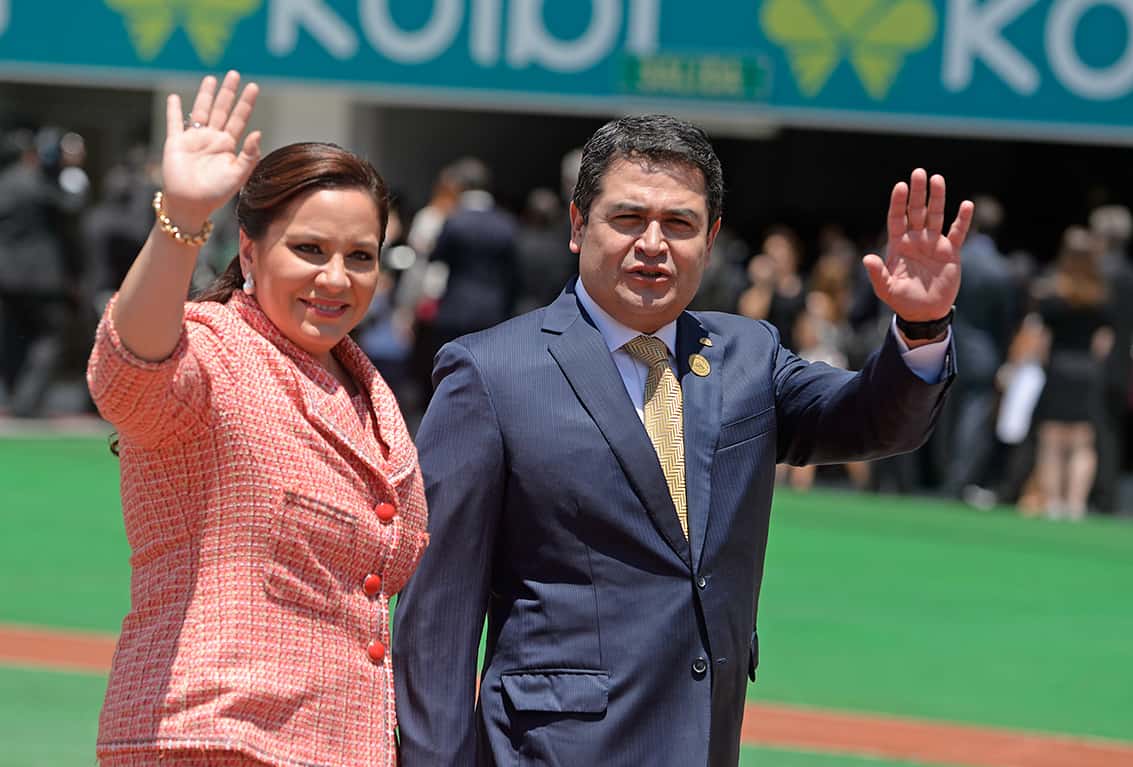Former Honduran President Juan Orlando Hernandez, whom the United States is seeking to extradite after accusing him of trafficking some 500 tons of cocaine, must appear this Wednesday before a judge in Tegucigalpa who will decide his fate.
Arrested Tuesday outside his Tegucigalpa home by police in coordination with U.S. agencies, including the Drug Enforcement Administration (DEA), Hernandez offered no resistance and allowed himself to be fitted with a bulletproof vest and handcuffed hand and foot with chains.
The right-wing former president, who left power to leftist Xiomara Castro on January 27 after ruling Honduras for eight years, spent the night in a police special forces barracks.
The spokesman of the Supreme Court of Justice, Melvin Duarte, explained that a judge chosen by that court will analyze the information sent by the United States to make a decision on the extradition. He specified that in other cases the extradition processes have not taken more than four months.
Celebrations throughout the Country
Hernández, 53, is accused by the U.S. government of trafficking some 500 tons of cocaine through Honduras, knowing it would end up in the United States, the U.S. embassy in Tegucigalpa said in a statement.
He faces three charges, including “conspiracy to import a controlled substance into the United States”. He is also accused of “using or carrying firearms (…) machine guns and destructive devices”. A third charge is for “conspiracy to use or carry firearms (…) in furtherance of a conspiracy to import narcotics” into the United States.
Hernandez is accused of conspiring with his brother Tony, a former congressman who was sentenced to life in prison for drug trafficking in New York last year. When the extradition request was announced, dozens of people arrived with banners and Honduran flags at Hernández’s house to celebrate, and celebrations broke out all over the country.
The former president, known by his initials JOH, is currently a member of the Central American Parliament (Parlacen), a benefit to which all former presidents of the region are entitled when they leave office. Although his lawyers claim that this grants him immunity, the Parlacen regulations do not contemplate this privilege for those who do not enjoy immunity in their own country. Honduran deputies do not have immunity.
Parlacen can also “lift and suspend the immunities and privileges of its deputies” at the request of the governments of its member countries.
A “Narco-State”
The head of U.S. diplomacy, Antony Blinken, said last week that Hernandez was included in July in a list of people accused of corruption or undermining democracy in Central America, and ordered “visa restrictions against the former president (…) due to corrupt acts”.
During the trial of Tony Hernandez, US prosecutors claimed that the former president “has received millions of dollars in bribes from drug traffickers such as Chapo Guzman, who personally delivered one million dollars” to Tony to bribe his brother.
US prosecutors called JOH a “co-conspirator” in the indictment against his brother Tony, and claimed that he turned Honduras into a “narco-state”. At the trial of another Honduran narco in New York, Geovanny Fuentes, a witness said he heard JOH boast that he was going to “put the drugs under the gringos’ noses” and they “wouldn’t even notice.
Fuentes was sentenced in February in New York to life in prison for shipping “tons” of cocaine to the United States in collusion with high-ranking politicians, including former President Hernández, according to the indictment.
“According to multiple credible media reports,” Hernandez “has engaged in significant corruption by committing or facilitating acts of corruption and drug trafficking, and by using the proceeds of illicit activities for political campaigns,” Blinken said.
Hernández denies this and claims that the United States bases its accusations on “statements by confessed drug traffickers and murderers” who were extradited by his government. Fabio Lobo, son of former Honduran President Porfirio “Pepe” Lobo (2010-2014) – of the National Party, the same as the Hernandezes – was sentenced to 24 years in prison in New York in 2017 for helping to smuggle 1.4 tons of cocaine into the United States.
by Noe LEIVA






